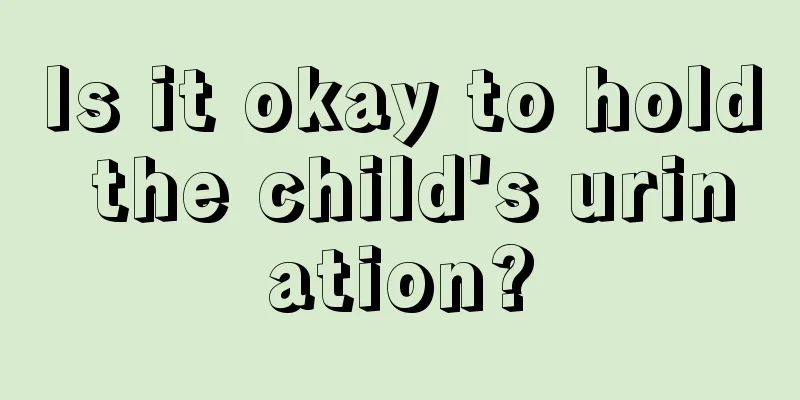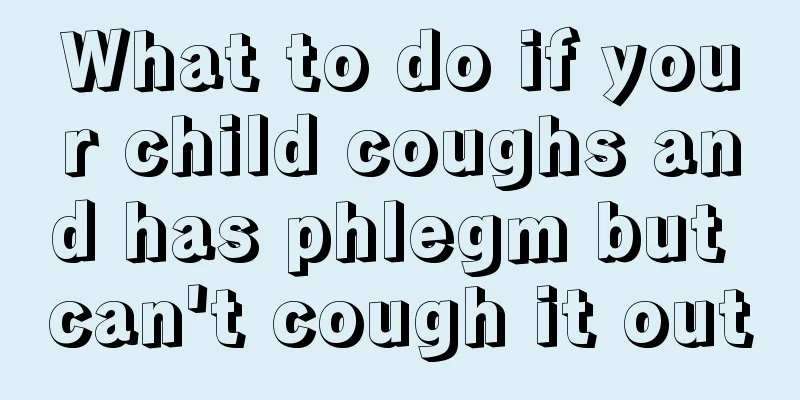Is it okay to hold the child's urination?

|
Holding a child to urinate is something that every parent will do when the child is young. Because children are young, they cannot control their urination independently, so they need the assistance of their parents to complete the act of urination. However, there is a saying that holding a child to pee is not a good thing and may bring some bad effects to the baby. So let’s introduce whether it is good to hold a child to pee. Is it okay to hold the baby's bladder? No, in fact, if you don't hold your child to pee, the child will learn to pee independently earlier. Studies have found that many children who wear diapers to sleep at night can control nocturnal urination, or hold their urine all night until morning, around the age of 2 or even earlier. This is because children who are not held up while urinating have always urinated based on their urge to urinate, so they have a better grasp of their urge to urinate. Most children who need to be helped to urinate at night still need their parents to get up in the middle of the night to help them urinate when they are 2 years old. Children who are held up to urinate too often are always confused between urinating based on the urge to urinate and urinating based on the action of being held up to urinate, and have a poor understanding of the urge to urinate. 1. Holding urine takes time and energy. Those who support holding the baby in the diaper also believe that mothers do not have to hold the baby in the diaper 24 hours a day. They can hold the baby in the diaper when they do not go out during the day and use diapers at other times. However, this may be confusing for your baby. In fact, the more consistently a mother holds her baby to urinate, the higher her chances of success. If the mother has returned to work and has hired a nanny, you have to convince the nanny to insist on changing the baby's diaper. So no matter what, mother has to devote a lot of time and energy to it. 2. Your baby may not be ready yet. Child development experts say that babies cannot control their bladder and bowel movements until they are 12 months old, and have only a little self-control until they are 18 months old. Although every baby is different, most babies are unable to consciously go to the toilet on their own and cannot tell their mothers when they need to defecate before they are 18 months old. 3. The baby may resist. The process of changing your baby's diaper is not always smooth sailing. Some babies cooperate with potty training for a few weeks, but wet their pants frequently after two weeks; some babies do not give their mothers any signals before defecation; and some babies resist potty training and even do not defecate for several days. If you do not grasp the right timing when potty training a child under one year old, it can easily cause the child to resist, which will make future toilet training difficult. 4. The baby may make mistakes. If the mother holds the baby's diaper without wearing a diaper, the baby may wet his pants frequently. Sometimes, the baby may not give the mother a signal that he needs to have a bowel movement, and the mother may not have time to catch the baby's urine. Although supporters of potty training insist that this method is generally cleaner than using diapers, mothers must always have cleaning supplies and a change of clothes for their babies ready. |
<<: What causes hematuria in children?
>>: Children's anal fissure ointment
Recommend
Chylothorax of the newborn
I believe many people know that the body of a new...
The dangers of pineal cysts in children
Cyst is a disease symptom that occurs in many peo...
At what age is it better for children to use pillows?
Parents are of course more concerned about their ...
Is it okay for my child to not wear glasses if he is nearsighted? This is what the experts answered
Many parents do not want their children to wear g...
What to do if your child's arm is sprained
There is a high probability that a child's ar...
What to do if your four-month-old baby has a runny nose
According to statistics, infants and young childr...
What medicine should be applied to children's scrotal itching
Many mothers know that little boys sometimes expe...
What are the dangers of obesity to children?
Childhood obesity has become a very serious topic...
Why do children have black teeth?
Children's teeth are relatively fragile. If y...
Symptoms of congenital heart disease in newborns
I don’t know if you have heard of congenital hear...
What should I do if my child has premature ventricular beats?
Premature beats generally refer to irregular cont...
Treatment for baby's eyes not closing tightly when sleeping
As parents, when our babies cannot close their ey...
What should I do if my child’s voice becomes hoarse from crying?
In our daily lives, mothers must have encountered...
Side effects of fever-reducing injections for babies
When many babies have a high fever, doctors will ...
Analysis of the relationship between urticaria and allergens in children
Urticaria in children develops very quickly. Basi...









